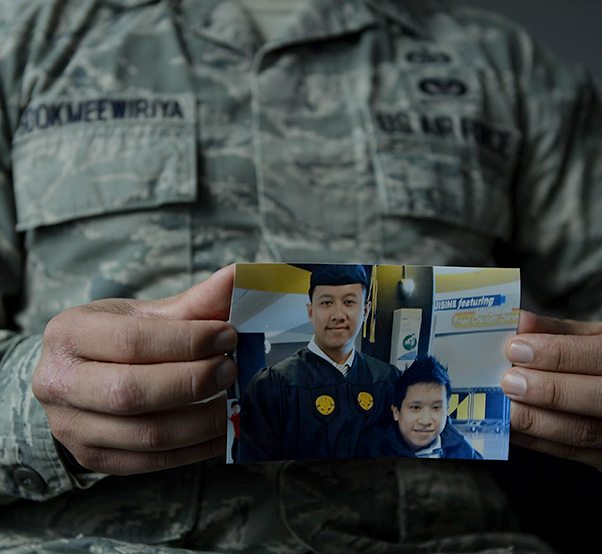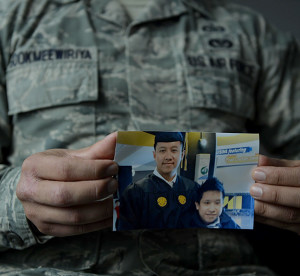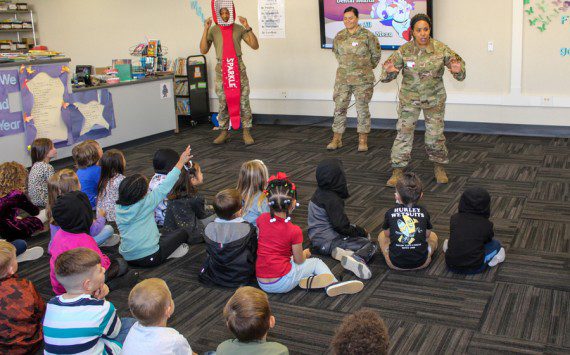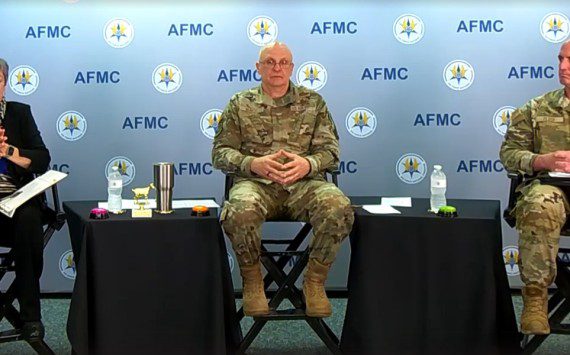Staff Sgt. Srun Sookmeewiriya, 313th Expeditionary Operations Support Squadron NCO in charge of reports, holds up a picture of him and his younger brother, Thana, on Ramstein Air Base, Germany, Feb. 16, 2017. Sookmeewiriya, who attempted to commit suicide twice, draws inspiration from his brother to remain resilient and encourages Airmen to open up about their struggles.
Staff Sgt. Srun Sookmeewiriya or Sook, as many people know him, may seem like a happy and carefree Airman at first glance.
The 313th Expeditionary Operations Support Squadron NCO in charge of reports regularly puts forth an earnest effort to keep his unit alive and running, so his dark past and struggle with depression and suicide come as a surprise to many.
“He’s like the morale person, that’s what everybody else refers him to,” said Master Sgt. Melissa Vela, the 313th EOSS NCO in charge of console operations. “He’s so full of energy. He’s so infectious, he makes everybody laugh.”
Unknown to many of his wingmen, Sook’s current persona is only possible because he recovered from serious trauma he experienced as a young man. When Sook still lived in his native Thailand, both his parents committed suicide. He witnessed his mother’s suicide, and found his father after he’d taken his own life, and attempted to kill Sook’s younger brother, Thana.
“I saw him lying there in bed,” Sook recounted about his father. “I wasn’t sure what happened. I tried to wake him up to see if he was still alive. I thought I was alone, and I didn’t know who I would go to now. My head was just spinning at that point, it was a shock.”
Thana survived the gunshot but was never the same, physically or mentally.
With his mother and father gone, Thana was the only family he had left. He went to a boarding school, where depression haunted him and other children bullied him for not having parents. This led to a suicide attempt by ingesting a large amount of over-the-counter medication. He was in a coma for two days.
Sook finished boarding school and eventually immigrated to the U.S., where Thana would join him soon afterward. Sook spent his early time in the U.S. with relatives from his father’s first marriage. He would bounce from family to family because of his troubled personality. He also felt as if he was just an outsider because of his status as a “half-relative.”
“I felt like I didn’t belong, because I wasn’t a part of their family,” Sook said. “I didn’t feel any emotion when I hugged them.”
The feeling of being an outsider overwhelmed Sook and he tried to kill himself again.
“I didn’t want to deal with the state I was in: not feeling welcome and not feeling like I was part of the family,” he said. “At that time as a kid, I thought that the best way was to just end it all and leave.”
Sook tried to hide his attempted suicide, but his relatives eventually found out and sent him to a doctor to get help. His half-sister, Kim, was especially appalled, and confronted him about what he done. She asked, “What about your brother?”
“When she mentioned my brother, I totally thought, ‘Oh my gosh, I’m leaving him behind,” Sook recalled. That’s when he decided to turn around and confront his issues, not run from them. Sook described his brother as his inspiration in his fight against depression.
“He was the only family I had up to that point. It was me and him. He has been through a lot tougher things than I had. Because of the gunshot wound, he was scarred for life. He didn’t grow up normally, but he never gave up. That’s one reason why I should not and will not give up on him, because he didn’t either.”
As part of his process of recovery, Sook found strength in his faith and his sister Kim, who helped him get back on his feet.
“It took me a while, basically a couple years,” he said, explaining that his recovery process did not happen overnight. “I think I’m still bouncing back to this day. I think of this tragedy as a lesson, and that lesson is to not repeat the same thing that they did.”
Sook joined the Air Force as a civil engineer Airman, and cross-trained to be an air mobility controller. He adopted Thana as his dependent, and eventually married and started a family.
Sook noted that although his life still has its ups and downs, he copes by confiding in his wife. He also expressed gratitude for the support his coworkers give him continuously.
“Having a good work center in the Air Force actually helped me out a lot,” he said. “When I have other issues, they continue to help me out.”
Vela described how surprised she was when Sook opened up his past to her, saying that she would have never guessed that an Airman like Sook would have such a traumatic past.
“I was speechless the whole time he told his story,” she recalled. “I was like, ‘Oh my God, are you ok?’ To me, I can see the strength in his words and his actions. Seeing the strength that he had to come forth and tell his story is amazing.”
Sook shares his story occasionally with the public, hoping to encourage people suffering from depression to seek help and to not try to survive on their own. He emphasizes how important it is to open up to people who care, and that there are many people standing by ready to assist in the battle against depression.
“There are so many agencies on base which can help,” Sook said. “Don’t bottle up those issues. If you stress out, talk it out. Find somebody who is willing to listen.”
Sook encouraged Airmen to look for a cause, and do what it takes to survive so they can continue to fight for it.
“Don’t give up, look for what you’re fighting for,” he said. “I fight for my brother, my wife, and my kids. It’s their future and my future.”
Visit Wingman Online, the Air Force suicide prevention and resilience website for more resources, or call the Military Crisis Line at 1-800-273-8255 if you or someone you know needs confidential support.













